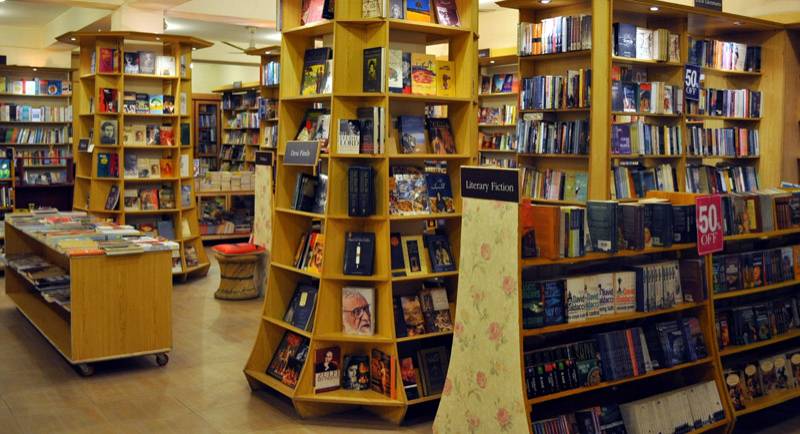
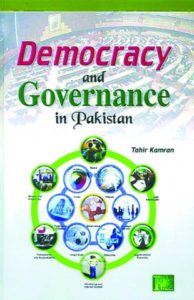
Democracy and Governance in Pakistan
Tahir Kamran
Peace Publications (1958)
Rs695
Tahir Kamran’s book Democracy and Governance in Pakistan plainly demonstrates that the creation of Bangladesh was the result of erroneous policies pursued by the civil military bureaucratic oligarchy of Pakistan. Bengalis were continuously and consistently denied their political and cultural rights that finally resulted in the dismemberment of Pakistan.
Kamran has tried to address the important question of why democratic institutions could not flourish in Pakistan while India, with almost similar historical experiences, managed to at length in his book.
Kamran writes that Jinnah reposed no confidence in his colleagues. Immediately after the creation of Pakistan he opted for the office of Governor General. He trusted the bureaucracy more than the politician. That set a wrong tradition at the outset.
After the death of Jinnah, first Liaquat Ali and then Ghulam Muhammed abused the powers of the Governor General. The Planning Committee, a club of bureaucrats, became more important than political parties and electoral politics.
Kamran also writes that the area constituting Pakistan was a recruiting ground for the British army. Landowners of Punjab supplied human fodder for the world wars from this area. So there was already a nexus between the military and the landed elite before the creation of Pakistan. That nexus was strengthened after the creation of Pakistan. This implies that there was no conflict of interest between the landed elite and the military bureaucracy. However, initially the civil bureaucracy called the shots while the military acted as a junior partner, this continued till Ayub Khan’s era. (Review by Bilal Ahmad for Foreign Policy Association)
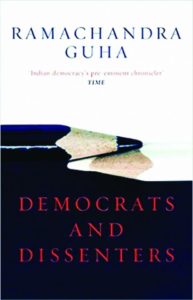
Democrats and Dissenters
Ramachandra Guha
Penguin Random House India (2016)
Rs1,395
A major new collection of essays by Ramachandra Guha, Democrats and Dissenters is a work of rigorous scholarship on topics of compelling contemporary interest, written with elegance and wit.
The book covers a wide range of themes: from the varying national projects of India’s neighbours to political debates within India itself, from the responsibilities of writers to the complex relationship between democracy and violence. It has essays critically assessing the work of Amartya Sen and Eric Hobsbawm, essays on the tragic predicament of tribals in India—who are, as Guha demonstrates, far worse off than Dalits or Muslims, yet get a fraction of the attention—and on the peculiar absence of a tradition of conservative intellectuals in India.
Each essay takes up an important topic or an influential intellectual, as a window to explore major political and cultural debates in India and the world. Democrats and Dissenters is a book that is certain to be widely read and even more widely discussed.
Ramachandra Guha’s many books include a pioneering work of environmental history (The Unquiet Woods, 1989), an award-winning social history of sport (A Corner of a Foreign Field, 2002) and a widely acclaimed and bestselling work of contemporary history (India after Gandhi, 2007). The first volume of his landmark biography of Gandhi, Gandhi before India, was published in 2013; the second and concluding volume will be published in early 2018.
Guha’s awards include the R.K. Narayan Prize, the Sahitya Akademi Award, the Ramnath Goenka Prize and the Padma Bhushan. In 2014 he was awarded an honorary doctorate in the humanities by Yale University. In 2015 he won the Fukuoka Prize for contributions to Asian culture and scholarship.

The Colours of My Heart: Selected Poems
Faiz Ahmad Faiz
Penguin (2017), Rs995
Faiz Ahmed Faiz is widely regarded as the greatest Urdu poet of the twentieth century, and the iconic voice of a generation. Although he is best remembered for his revolutionary verses that decried tyranny and called for justice, his oeuvre also extended to scintillating, soulful poems of love. In this remarkable selection of Faiz’s most memorable poems and ghazals, readers will be able to experience a new dimension of the great poet’s genius. Along with popular favourites like ‘Subh-e Azadi’, with its anguished evocation of the horror and pain of the Partition, The Colours of My Heart also introduces readers to little-known gems that display Faiz’s extraordinary flair for tender hope and quiet longing.
A rich cornucopia of delights, The Colours of My Heart celebrates Faiz’s greatest work. Baran Farooqi’s superb translation is accompanied by an illuminating introduction to Faiz’s incredible life and enduring legacy.
Faiz Ahmad Faiz (1912–1984) was one of the most exemplary poets of the Indian subcontinent. His poetic voice, full of revolutionary fervour and also revolutionary melancholy, tugged at the heart of the Urdu reader particularly because he filled his poetry with words used mostly in pre-modern ghazals which have a resonance of their own. Faiz was able to convey the message of revolution without compromising the delicate subtlety of Urdu literary vocabulary. He published eight volumes of poetry in his lifetime. His popularity remains undiminished even now.
Baran Farooqi is a distinguished translator into English from Urdu. Among her important published translations are the well-known short-story collection Baad-e Saba ka Intezar by Syed Muhammad Ashraf and many critical writings of the great Urdu critic Muhammad Hasan Askari. She has also written about and translated some of the leading woman modern Urdu poets. She is a professor of English at Jamia Millia Islamia, New Delhi.
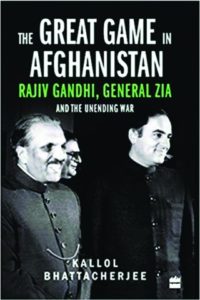
The Great Game in Afghanistan: Rajiv Gandhi, General Zia and the Unending War
Kallol Bhattacherjee
HarperCollins India (2017), Rs1,195
Afghanistan is one of the pulse points of the violent and insidiously interconnected conflicts that grip South Asia today. At the height of the Soviet occupation of Afghanistan, a complex multinational diplomacy had proposed setting up a coalition government in Kabul as a solution to the Afghan problem. Even as all sides worked on the coalition, the US took steps that India considered a stab in the back. Rajiv Gandhi, who played an integral part in this diplomacy, reacted by joining hands with President Najibullah of Afghanistan, which eventually wrecked the chances of the coalition. Interestingly, US ambassador John Gunther Dean blamed his country for letting down Rajiv Gandhi. General Zia-ul-Haq of Pakistan queered the pitch by going against the Geneva Accord of 14 April 1988, which required him to end the supply of weapons to the mujahideen in exchange for Soviet withdrawal. Shortly after, General Zia died in a mysterious air crash, complicating the Afghan muddle. Relying on the official papers that Dean collected between 1985 and 1988, and conversations with Ronen Sen, Rajiv Gandhi’s diplomatic aide during those crucial years, Kallol Bhattacherjee investigates the crucial years that could have changed the course of the region s blood-soaked history.
Kallol Bhattacherjee has been a journalist since 2001 and has reported extensively on South Asian affairs and about the conflicts in West Asia and North Africa. He has worked in the past with the Iranian News Agency, The Week and is currently a Senior Assistant Editor with The Hindu where he reports on diplomatic affairs.
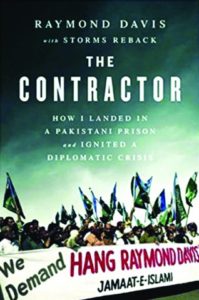
The Contractor: How I Landed in a Pakistani Prison and Ignited a Diplomatic Crisis
Raymond Davis
BenBella Books (2017)
Rs1,495
A lot has been written about the time contractor Raymond Davis spent in a Pakistani jail in 2011. Unfortunately, much of it is misleading—or downright false—information.
Now, the man at the center of the controversy tells his side of the story for the very first time. In The Contractor: How I Landed in a Pakistani Prison and Ignited a Diplomatic Crisis, Davis offers an up-close and personal look at the 2011 incident in Lahore, Pakistan, that led to his imprisonment and the events that took place as diplomats on both sides of the bargaining table scrambled to get him out.
How did a routine drive turn into front-page news? Davis dissects the incident before taking readers on the same journey he endured while trapped in the Kafkaesque Pakistani legal system. As a veteran security contractor, Davis had come to terms with the prospect of dying long before the January 27, 2011 shooting, but nothing could prepare him for being a political pawn in a game with the highest stakes imaginable.
An eye-opening memoir, The Contractor takes the veil off Raymond Davis’s story and offers a sober reflection on the true cost of the War on Terror.
“Reading Ray’s account brought back a lot of memories about the difficult challenges he faced. The book is a tribute to those public servants like Ray who quietly do their job, put their lives on the line, and will do whatever is necessary to protect and defend their country. He is a silent patriot.” (Leon E. Panetta, Chairman of The Panetta Institute for Public Policy)
Raymond Davis is a former United States Army soldier and military contractor who became the center of an international maelstrom after his involvement in a shooting in Lahore, Pakistan on January 27, 2011. Born and raised in Big Stone Gap, Virginia, Davis spent 10 years in the army, the last six of which he spent as a member of the Special Forces. After being discharged from the army in 2003 because of an injury, Davis worked as a private contractor providing operational security in Afghanistan and Pakistan.
Storms Reback is the author of three books All In: The (Almost) Entirely True History of the World Series of Poker, Farha on Omaha: Expert Strategy for Beating Cash Games and Tournaments, and Ship It Holla Ballas!: How a Bunch of 19-Year-Old College Dropouts Used the Internet to Become Poker’s Loudest, Craziest, and Richest Crew. He lives in Austin, Texas with his wife and children.

